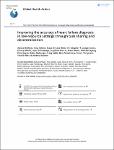| dc.contributor.author | DeWyer, Alyssa | |
| dc.contributor.author | Scheel, Amy | |
| dc.contributor.author | Otim, Isaac Omara | |
| dc.contributor.author | Longenecker, Christopher T. | |
| dc.contributor.author | Okello, Emmy | |
| dc.contributor.author | Ssinabulya, Isaac | |
| dc.contributor.author | Morris, Stephen | |
| dc.contributor.author | Okwir, Mark | |
| dc.contributor.author | Oyang, William | |
| dc.contributor.author | Joyce, Erine | |
| dc.contributor.author | Nabongo, Betty | |
| dc.contributor.author | Sable, Craig | |
| dc.contributor.author | Alencherry, Ben | |
| dc.contributor.author | Tompsett, Alison | |
| dc.contributor.author | Aliku, Twalib | |
| dc.contributor.author | Beaton, Andrea | |
| dc.date.accessioned | 2023-07-17T12:07:25Z | |
| dc.date.available | 2023-07-17T12:07:25Z | |
| dc.date.issued | 2019 | |
| dc.identifier.citation | DeWyer, A., Scheel, A., Otim, I. O., Longenecker, C. T., Okello, E., Ssinabulya, I., ... & Beaton, A. (2019). Improving the accuracy of heart failure diagnosis in low-resource settings through task sharing and decentralization. Global Health Action, 12(1), 1684070. | en_US |
| dc.identifier.uri | https://doi.org/10.1080/16549716.2019.1684070 | |
| dc.identifier.uri | http://ir.lirauni.ac.ug/xmlui/handle/123456789/732 | |
| dc.description.abstract | Background: Task sharing of TTE may improve capacity for heart failure diagnosis and
management in patients in remote, low-resource settings but the impact on diagnostic
accuracy and patient outcomes has not been studied.
Objectives: Determine feasibility and impact of non-expert training in transthoracic echocardio graphy (TTE) to improve the diagnosis and outcomes of patients with suspected heart failure in
Uganda.
Methods: This two-part study examined an innovative training program to develop TTE
competency among non-experts and used a pre-post design to determine the impact of
decentralized TTE. Four of 8 non-experts (50%) passed a three-part training course. The
training comprised of distance learning through a web-based curriculum, a 2-day hands-on
workshop with cardiologists, and independent practice with remote mentorship. Continuous
measures were compared (pre- vs. post-TTE) using t-tests or Wilcoxon rank-sum tests as
distributionally appropriate and categorical variables assessed through chi-square testing.
Sensitivity and specificity were calculated according to standard methodology comparing
diagnosis pre- and post-TTE during phase 2.
Results: Performance in the post-training phase showed good agreement with expert cate gorization (κ = 0.80) with diagnostic concordance in 421 of 454 studies (92.7%). TTE changed
the preliminary diagnosis in 81% of patients, showing low specificity of clinical decision making alone (14.2%; 95% CI 10.1–19.2%). Dilated cardiomyopathy, hypertensive heart dis ease with preserved systolic function, and right heart failure were the most underdiagnosed
conditions prior to TTE while hypertensive heart disease with decreased systolic function was
the most over-diagnosed condition.
Conclusions: In conclusion, non-expert providers can achieve a high level of proficiency for the
categorization of heart failure using handheld TTE in low-resource settings and use of telemedicine
and remote mentorship may improve performance and feasibility. The addition of TTE resulted in
substantial improvement in etiological specificity. Further study is needed to understand implications of this strategy on healthcare utilization, long-term patient outcomes, and cost. KEYWORDS: Echocardiography; Uganda; task-shifting; telemedicine; training | en_US |
| dc.language.iso | en | en_US |
| dc.publisher | Global Health Action | en_US |
| dc.subject | Echocardiography | en_US |
| dc.subject | Uganda | en_US |
| dc.subject | task-shifting | en_US |
| dc.subject | telemedicine | en_US |
| dc.subject | training | en_US |
| dc.title | Improving the accuracy of heart failure diagnosis in low-resource settings through task sharing and decentralization | en_US |
| dc.type | Article | en_US |

